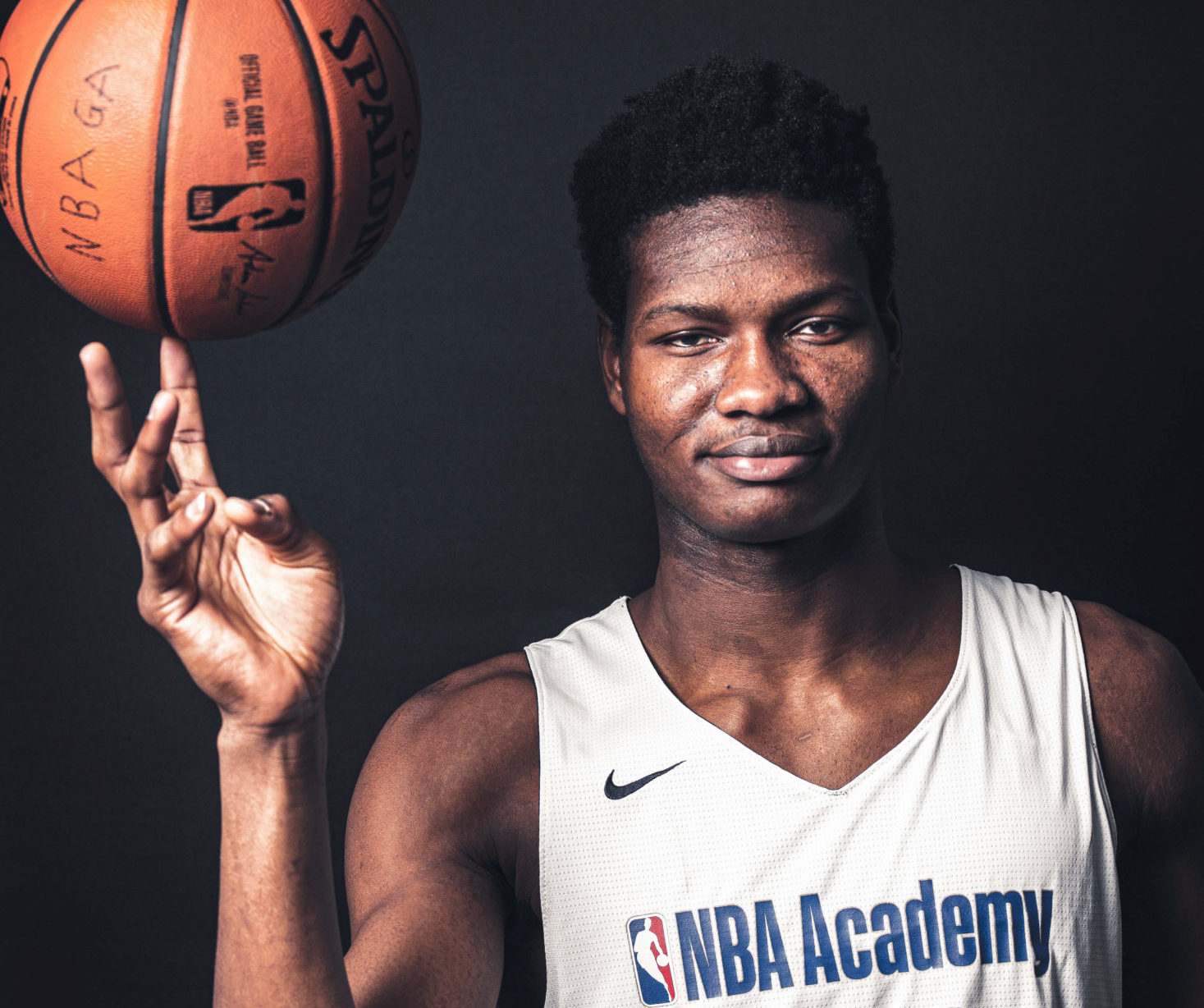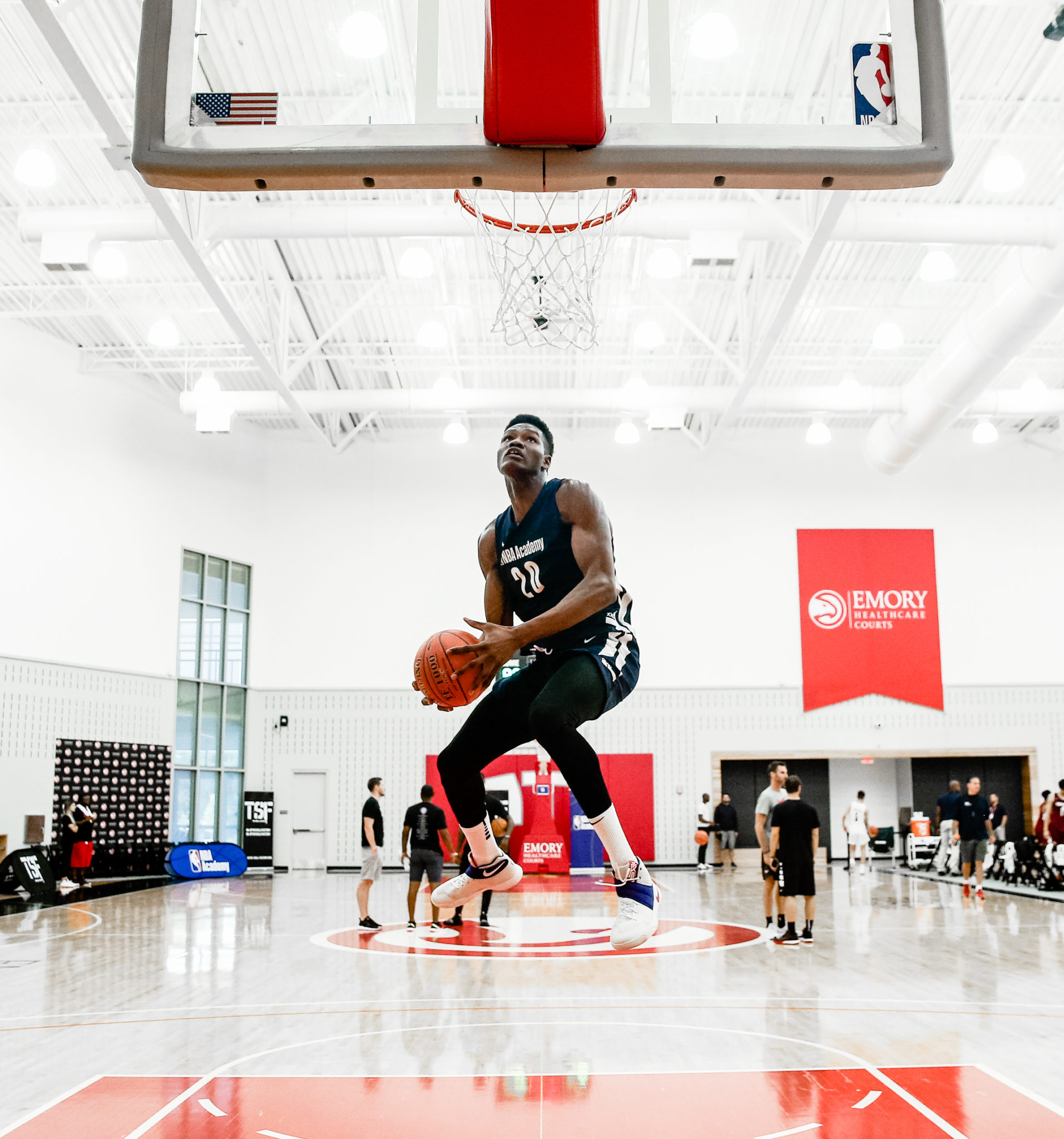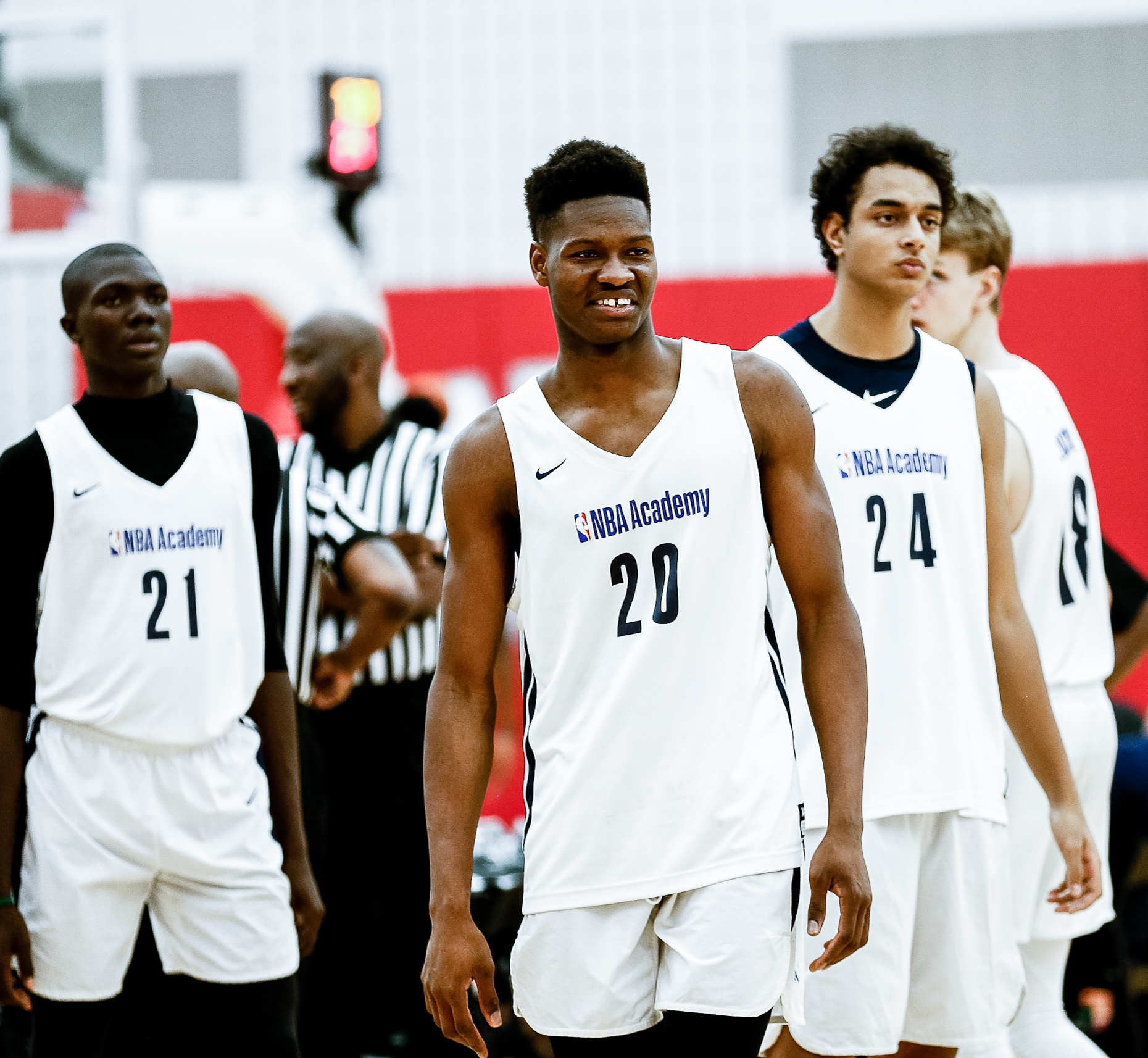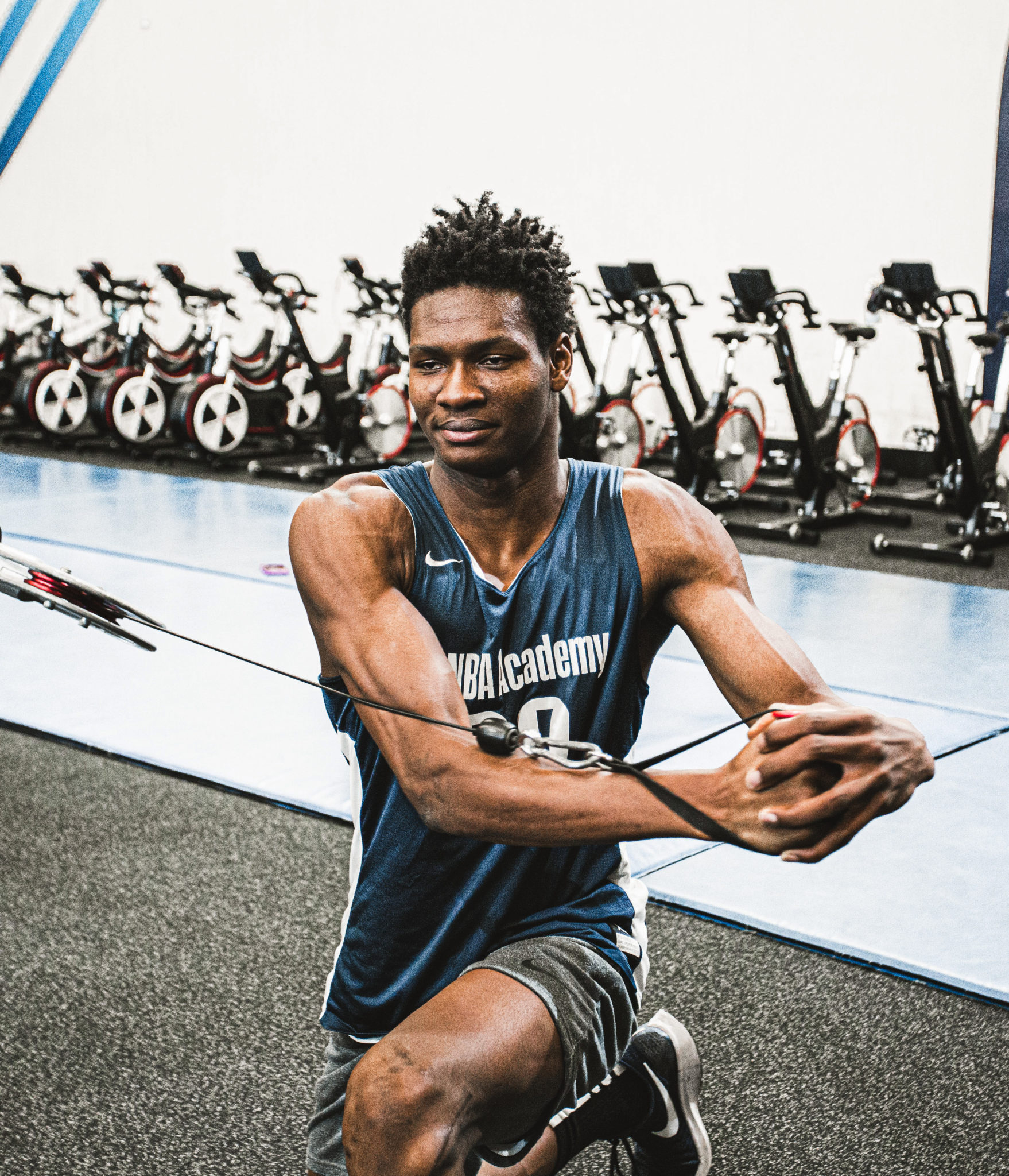
Nigeria’s Efe Abogidi Ready for Liftoff from NBA Academy
LAS VEGAS -- The word “viral” carries a much heavier connotation these days. But in 2017, years before the coronavirus shut down the basketball world (and much of human society), a 15-year-old from Nigeria rose up and went, yes, viral on social media from across the Atlantic.
The SEED (Sports for Education and Economic Development) Project’s 15th annual Hoop Forum was drawing to a close in Senegal. For four days in May, 80 of Africa’s most promising boys and girls basketball players gathered with coaches, international guests and regional hoops luminaries—including NBA veteran and Senegal native Gorgui Dieng, and then-NBA Africa executive Amadou Gallo Fall—to celebrate and actuate the game’s growth across the continent.
The Hoop Forum culminated with basketball festivities on an outdoor court at the African Renaissance Monument in Dakar. The boys and girls put on their own shows during their respective All-Star games, but nothing captivated attendees quite like the Dunk Contest—and no dunker was more dazzling than Efemena “Efe” Abogidi.
Efe’s length and athleticism allowed him to float through the first two rounds of the competition. For his third dunk, he channeled his inner Michael Jordan—or, perhaps more fittingly, his inner Serge Ibaka—and took off from the free throw line for the contest-clinching flush. Had the competition been staged indoors, the reaction all around may well have brought the proverbial house down.
“It was spectacular, man,” Efe tells CloseUp360 of the dunk. “I mean, being able to pull off that kind of a dunk in a place where there's a lot of people, like NBA scouts watching and coaches watching, I think I proved myself there.”
Three months later, the NBA reposted a video of Efe’s dunk to its official Instagram account, where it has since been watched nearly two million times.
“I wasn't really on Instagram or Twitter back then,” he says, “but yeah, I should've been famous back then.”
That moment put Efe on the basketball world’s radar. He would go on to earn entry into the prestigious NBA Academy program and, eventually, scholarship offers from NCAA Division I schools in the United States.
But before he could parlay his soaring slam into hoops stardom, Efe would have to face down the fickle fragility of his own awe-inspiring athleticism and rise up, just as he did from that court in West Africa.
Basketball wasn’t exactly booming in Nigeria’s Delta State back in the early 2010s. The game barely penetrated the walls of the Abogidi household, much less the sporting conscience of Africa’s most populous country.
Nobody in Efe’s family—not his parents, not his five siblings, not even the circle of extended family and friends who surrounded him as a child—had ever hooped.
“Where I grew up, basketball is not really something,” Efe says. “The sport is always soccer.”
Soccer was (and still is) Nigeria’s most popular sport by far, and Efe was well suited to it. He was already a track star, and the same physical gifts that helped him excel as a sprinter, long jumper and high jumper also made him an obvious talent on the pitch.
Efe’s size certainly didn’t hurt either. That, along with his leaping ability, made him a natural to play basketball. And with all the sports Efe had tried (and at which he had excelled), what was one more to add to the list?
“I just played it for fun,” he says. “I wasn't really expecting to go places in basketball. I just thought it was fun playing basketball. I'm tall. I've got a long wingspan. It's a gift. God gave it to me, so I've gotta use it.”
What Efe didn’t have was coaching. His only tutor (if you can call it that) was YouTube, with its abundance of basketball content. Of all the NBA players whose highlight reels he consumed—including Kobe Bryant’s—Efe took a particular interest in Tim Duncan. For a kid whose fundamentals were lacking, who better to study than the Big Fundamental himself?
“He played slow and smart,” Efe says. “Though our games are different, I used to love the way he played.”
When he wasn’t cramming clips of Tim’s moves, Efe could be found trying them out for himself in the streets. He would train on his own, play pickup games with other kids in the neighborhood and head home before doing it all over again the next day.
Soon enough, Efe started to stand out, thanks to his physical gifts. Then, as he began to understand the rules of the game, he became unstoppable.
“I was pretty much dominating where I lived because nobody's as athletic and tall as me,” he says.
Efe did what he could to seek out stiffer competition. He would leave Delta State, where his family lived, to play pickup games in neighboring states.
Different places, same results.
For Efe, those successes validated his choice of sports. He could be good (maybe even great) at basketball.
But without quality competition or coaching of any kind, the most he could do to improve on his own was to study more YouTube videos and work on his athleticism, as he had during his days as a track athlete.
So Efe kept looking. Soon enough, he found the place and the person that would set him on a path to hoops stardom.

Though he had hops like Kobe Bryant, Efe Abogidi was more inclined to study Tim Duncan's fundamentals early on. (NBA Academy/Nicole Sweet)
For most people who were there on that sunny May day in Dakar, at the conclusion of the SEED Project’s Hoop Forum, Efe’s Air Jordan impression likely came as a shock. For Olumide Oyedeji, there wasn’t so much a sense of surprise as a knowing smile.
“That was nothing to me,” the former NBA veteran tells CloseUp360 by phone from Nigeria. “I've seen him done crazier things more than that.”
Like the time Efe got up so high to block a shot that his shoulder reached rim height. Or the time Efe pleaded with an opponent to shoot, only for that foe to refuse out of fear that his shot would get blocked. Or that other time when Efe dunked on an 11-and-a-half-foot basket—a full 18 inches above a regulation hoop.
Athleticism was never an issue for Efe. Neither was competitive drive.
“You could see the hunger, fire, passion out of him,” Olumide says. “Just like, I could see a lot of things, a lot of potential. But just need to be harnessed, so need to be taught, never been taught.”
That began to change in 2014, when Efe first made his way to Olumide’s camp in Lagos.
By then, Olumide had been running his camps—among the largest in all of Africa—for well over a decade. The 38-year-old native of Ibadan, Nigeria, had established the Olumide Oyedeji Youth Foundation (OOYF) in 2000, not long after he joined the Seattle SuperSonics as a second-round pick in that year’s NBA draft. Since then, more than 40,000 kids around the world have participated in Olumide’s programs, with more than 300 earning scholarships from his foundation.
When Efe arrived at the camp in Lagos, he was “really extremely raw,” Olumide says, “but very dedicated, very devoted” and could “run like a deer.” He was also skinny and lacked basic on-court abilities, let alone intermediate or even advanced skills.
At the camp, Efe found opponents who were bigger and stronger than him and could outwit him with their knowledge of the game.
“He struggled,” Olumide says.
Efe, though, wasn’t so much deterred as determined to improve. During the year that followed, he took what he’d learned from the coaches at Olumide’s camp—the fundamentals of the game, a greater understanding of how to train his body and mind for on-court competition—and put it into practice on his own.
In 2015, Efe returned to Lagos, where he earned MVP honors at Olumide’s camp. He came back a third time in 2016.
Same camp, same result: another MVP for Efe.
“[Olumide] had no choice to give me a scholarship to go somewhere,” Efe says.
That somewhere was right there in Lagos, where Olumide’s foundation put on a program called Hoops & Read that combined basketball and education. At 14, Efe would be separated from his family and friends in Delta by a two-hour flight, doggedly chasing a future in hoops.
In the fall of 2016, Efe led the Hoops & Read basketball team to a 7-0 record in the National Division I Men’s Championship, an event that Olumide likened to an AAU tournament. That run earned Hoops & Read a promotion into the Nigerian Premier Basketball League, the country’s top professional hoops competition.
But Efe wouldn’t join that team in the pro ranks. Instead, he was on his way out of Nigeria entirely to pursue an opportunity that would bring him another leap closer to his dream—but not without trial.
In the fall of 2016, the NBA took a particularly meaningful step into the realm of grassroots basketball. That October, the league launched three academies across China—in Hangzhou, Jinan and Urumqi—where the country’s top young hoops prospects would work with NBA-trained coaches on the court and continue their classroom education off of it.
The following year, the NBA opened academies in Latin America, India and Africa, along with a Global Academy, to serve as the hub for the program’s very best prospects, in Australia.
In May 2017, when the NBA Academy Africa opened its doors in Thies, Senegal, Efe was among the first to walk through, as a member of the school’s inaugural class. It was there and then that he participated in the SEED Project’s Hoop Forum, where he pulled off the free-throw-line dunk that initially exposed his talents to the wider world.
“Based on Efe’s standout performance at the recent development camp, and his exemplary on-court and off-court skills, we are pleased to offer him the opportunity to join the very first class at NBA Academy Africa,” Amadou, then the vice president and managing director of NBA Africa, said in a statement at the time.
Though this path was a new one for everyone who walked it, Efe appeared to be on his way to a bona fide career in basketball by virtue of the resources now at his daily disposal. He would get to learn the game from NBA-caliber coaches, work on his skills at dedicated facilities, and compete with and against the most promising players from every corner of Africa, all while completing his secondary school education.
In June 2017, Efe and his classmates flew to Canberra, Australia, for the inaugural Academy Games. Over eight days, they would compete against some of the top young players from all over the world at the Centre of Excellence (COE) on the campus of the famed Australian Institute of Sport (AIS), where the NBA Global Academy was housed.
From the opening tip, Efe proved to be one of the brightest stars—not only on the NBA Africa team, but also in the entire field. In his first game, he scored a team-high 20 points on 9-of-15 shooting, grabbed 10 rebounds, and chipped in an assist and a steal during his 26-plus minutes in an 81-65 win over the Australian Capital Territory’s under-18 squad. Two days later, the African club suffered a 75-57 defeat to the COE’s own team, despite Efe’s 11 points and five boards in just over 13 minutes on the court. The day after that, NBA Africa came back to crush the Academy team from China’s Zhejiang province, 95-34, with Efe contributing 11 points, seven rebounds and a steal in a shade over 23 minutes.

Efe excelled at the inaugural NBA Academy Games in 2017. (NBA Academy/Nicole Sweet)
On the final day of the tournament, Efe was well on his way to another outstanding performance during the championship game. He was once again scoring nearly a point per minute (13 in 13:25) while grabbing six rebounds, blocking a shot and logging an assist.
The then-6’8” 16-year-old was poised to add to his impressive totals as his African team dominated the best of the best from the NBA Global Academy. He caught the ball on a fast break and, with his usual burst of athleticism, went up to dunk the ball.
But before he could finish the flush, Efe felt a hit from behind, fell backwards and landed awkwardly on his leg. Without thinking, he got up and tried to scurry back into the flow of the game, only to find an unusual, disconcerting feeling in his knee.
“I realized that there's something really bad and I was mentally like mad,” he recalls. “I was just like crazy. I wasn't going to play for a while.”
The NBA Academy Africa went on to beat the Global Academy, 74-51, and claim the championship at the Academy Games. Efe was named to the All-Tournament Team, but was no less distressed by the first major injury of his young basketball life.
The diagnosis: the ACL, MCL and meniscus in his knee were all torn. The prognosis: he wouldn’t be back on the court for another nine months, at the very least.
After undergoing surgery to repair the damage in his knee, Efe moved from the NBA Academy Africa in Senegal to the Global Academy in Australia, where he would have access to superior facilities and medical personnel for his rehab. Though he was dealing with considerable discomfort, Efe was initially in good spirits.
“For the first couple weeks, I was really mentally stable,” he says. “After a while, I got really confident and I was, like, ‘Hey, things happen, people get hurt, you just need to get back and put yourself in the way. Just feel like you recover from stuff like this, it's just part of basketball.’”
But Efe’s road to recovery was longer and more treacherous than he or anyone else could’ve expected. In 2018, he suffered a setback while attempting to return to the court, necessitating a second surgery. A third operation would soon follow.
For two years, Efe endured grueling rounds of physical therapy while battling the mental fatigue of a seemingly never-ending recovery process. With his family more than 9,000 miles away—and without the ability to play basketball and, in turn, bond with his teammates at the Global Academy—Efe grew distant. Doubts began to creep into his head.
Would I ever be healthy? Was my basketball career already over? Should I have rejoined my family in Nigeria, rather than staying in Australia?
Fortunately, Efe had plenty of support. His coaches and therapists at the Global Academy set his rehab program and made sure he followed through. His family back in Nigeria called every day to check on his progress and wish him well. Along the way, he heard frequently from another familiar and influential voice: Olumide’s.
“Stay strong, stay tough, stay dedicated,” Olumide told Efe. “The sky's the beginning.”
“I played pro for 20 good years, so I knew an injury would come,” Olumide says now. “But I wasn't really scared like that because he's a young man. He has a long road to recovery, and come out and just get stronger.”
Efe did just that. He rededicated himself to his studies, in both basketball and the classroom. He attended practices, closely observing his teammates and coaches from the sideline. He watched some practice sessions on video, too, and went back to YouTube to find more clips to pick apart.
Come 2019, once Efe’s knee could bear it, he stepped back on the court every day to rebuild his shot and develop a much smoother, more accurate stroke.
“The first time I got to the NBA Academy, I was athletic, but not as smart as I am right now,” he says. “I think I got way smarter. By not playing for two years, I got a feel of basketball like even better than before.”

Efe spent more than two years recovering from a devastating knee injury. (NBA Academy/Nicole Sweet)
It’s a chilly December day in Las Vegas. The gyms at Bishop Gorman High School are hopping as a who’s who of high school basketball comes through for the annual Tarkanian Classic.
There’s Mater Dei’s Devin Askew, a gifted guard who will be at Kentucky in the fall. Coronado’s Jaden Hardy, a junior who’s fielded tons of offers and could also end up in Lexington eventually. Mayfair’s Josh Christopher, now en route to Arizona State, strolls in for the late game with a tough act to follow: Bronny James and Sierra Canyon.
Off to the side, in Bishop’s auxiliary gym, comes the culmination of a years-long journey. For the first time in nearly two-and-a-half years, Efe is playing in a live game of competitive, five-on-five basketball—whistles and all.
His NBA Academy squad can’t quite keep up with its elite American prep competition, and Efe endures some struggles of his own, understandably so. After more than two years, three surgeries and countless hours of physical therapy, his timing and conditioning are bound to be off.
But overall, Efe is pleased with his defense, his shooting, his screening and, well, just being able to play basketball again.
“I feel amazing, man,” he says, his native Nigerian accent combining with the Australia affect he’s picked in Canberra. “I feel it's like a unique opportunity for me to be back on the floor playing. It's a different feeling. Being out and not playing for a long time, just having the chance to be part of the team, being part of basketball again is amazing.”
Now 6’10”, with his knee (and his 43-inch vertical leap) restored, Efe has plenty to look forward to—even beyond his next game at the NBA G League Winter Showcase in Las Vegas, in front of scouts and executives from across the league, over the weekend leading into Christmas.
Later this year, he will head to Washington State to begin his collegiate career. What began with a surprising Facebook message from a Cougars assistant coach in the spring of 2019 (while Efe was still recovering) evolved into a verbal commitment to the program in October and a signed National Letter of Intent this past November.
Thanks, in part, to his coaches at the Global Academy singing his praises to their college counterparts across the Pacific, Efe also garnered offers from Creighton University and the University of Texas at Arlington. The decision to go to Wazzu, he says, came down to the quality of the school, the competition in the Pac-12 Conference, and trust in head coach Kyle Smith and his staff.
It certainly helped that Efe has an uncle who lives in Pullman, and that his choice drew an endorsement from Olumide, who joined Efe on one of his visits to Washington State.
“He said, ‘Please, I just need your blessing. It's what I wanna do,’” Olumide says. “And I said, ‘Okay, just go ahead. I just want to see you happy. It's my only concern.’
“I believe he can grow there. He has a chance to come in and play and develop and be the best player he could be, and do something for himself and his family.”
Nowadays, Efe does more to pattern his game after those of Giannis Antetokounmpo and Kawhi Leonard than Tim Duncan’s. Like Giannis, he can trace his size, wingspan (7’4”) and athleticism back to his Nigerian roots. With his huge hands and defensive prowess, Efe has earned the nickname “The Klaw”—the same one Kawhi has carried for much of his NBA career—from his teammates in Canberra.
Comparisons like those could cloud the head of an 18-year-old kid like Efe. That he’s already been trained by NBA-approved coaches at NBA-caliber facilities through the NBA’s own grassroots program would suggest that he’d have his sights set on, well, the NBA.
But Efe knows how quickly hype can fade, how one leap can just as easily send a career soaring above the rim or crashing to the court.
“I don't want to think too big right now,” he says. “I just got to be focused on what I have right now and be the best at what I can be right now before thinking about the next step.”
Josh Martin is the Editorial Director of CloseUp360. He previously covered the NBA for Bleacher Report and USA Today Sports Media Group, and has written for Yahoo! Sports and Complex. He is also the co-host of the Hollywood Hoops podcast. Follow him on Twitter and Instagram.

Instagram
Error: API requests are being delayed for this account. New posts will not be retrieved.
Log in as an administrator and view the Instagram Feed settings page for more details.
Twitter
Error: Could not authenticate you.
Facebook
Subscribe